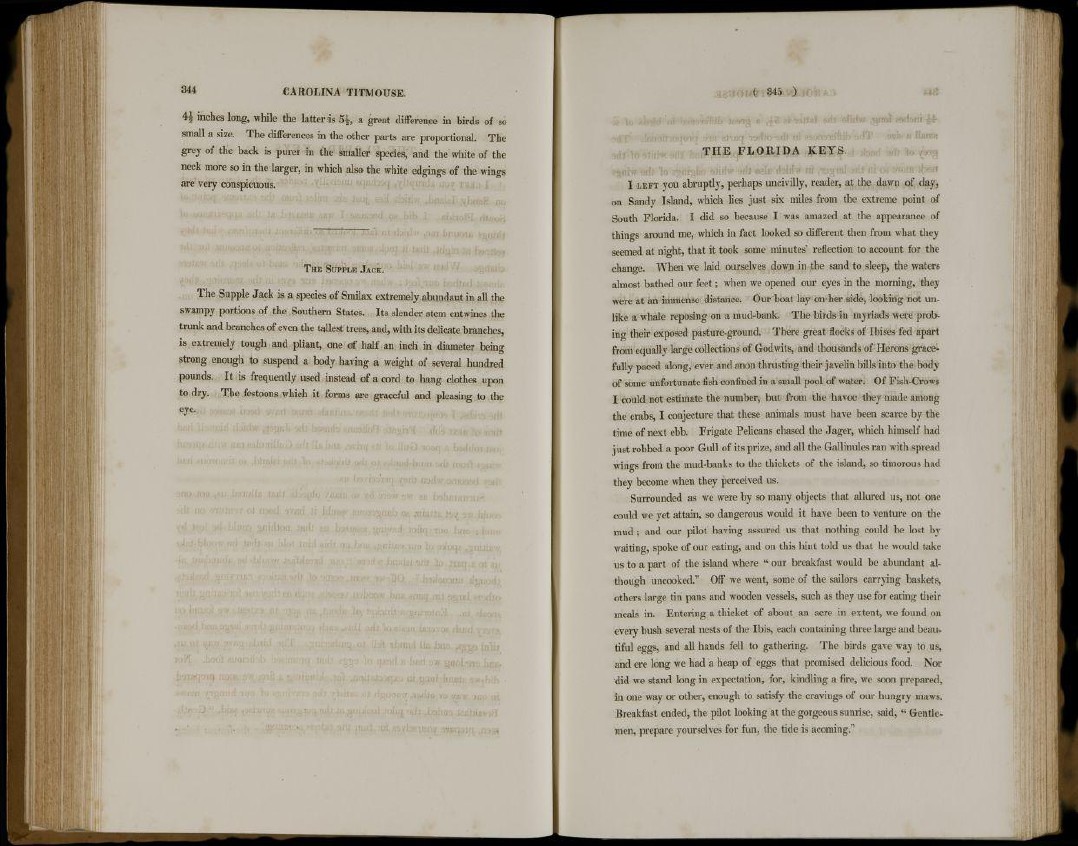
344 C A R O L I N A T I T M O U S E .
4£ inches long, while the latter is 5^, a great difference in birds of so
small a size. The differences in the other parts are proportional. The
grey of the back is purer in the smaller species, and the white of the
neck more so in the larger, in which also the white edgings of the wings
are very conspicuous.
THE SUPPLE JACK.
The Supple Jack is a species of Smilax extremely abundant in all the
swampy portions of the Southern States. Its slender stem entwines the
trunk and branches of even the tallest trees, and, with its delicate branches,
is extremely tough and pliant, one of half an inch in diameter being
strong enough to suspend a body having a weight of several hundred
pounds. It is frequently used instead of a cord to hang clothes upon
to dry. The festoons which it forms are graceful and pleasing to the
eye.
{ 345 )
T H E F L O R I D A KEYS
I LEFT you abruptly, perhaps uncivilly, reader, at the dawn of day,
on Sandy Island, which lies just six miles from the extreme point of
South Florida. I did so because I was amazed at the appearance of
things around me, which in fact looked so different then from what they
seemed at night, that it took some minutes'' reflection to account for the
change. When we laid ourselves down in the sand to sleep, the waters
almost bathed our feet; when we opened our eyes in the morning, they
were at an immense distance. Our boat lay on her side, looking not unlike
a whale reposing on a mud-bank. The birds in myriads were probing
their exposed pasture-ground. There great flocks of Ibises fed apart
from equally large collections of Godwits, and thousands of Herons gracefully
paced along, ever and anon thrusting their javelin bills into the body
of some unfortunate fish confined in a small pool of water. Of Fish-Crows
I could not estimate the number, but from the havoc they made among
the crabs, I conjecture that these animals must have been scarce by the
time of next ebb. Frigate Pelicans chased the Jager, which himself had
just robbed a poor Gull of its prize, and all the Gallinules ran with spread
wings from the mud-banks to the thickets of the island, so timorous had
they become when they perceived us.
Surrounded as we were by so many objects that allured us, not one
could we yet attain, so dangerous would it have been to venture on the
mud ; and our pilot having assured us that nothing could be lost by
waiting, spoke of our eating, and on this hint told us that he would take
us to a part of the island where " our breakfast would be abundant although
uncooked.'" Off we went, some of the sailors carrying baskets,
others large tin pans and wooden vessels, such as they use for eating their
meals in. Entering a thicket of about an acre in extent, we found on
every bush several nests of the Ibis, each containing three large and beautiful
eggs, and all hands fell to gathering. The birds gave way to us,
and ere long we had a heap of eggs that promised delicious food. Nor
did we stand long in expectation, for, kindling a fire, we soon prepared,
in one way or other, enough to satisfy the cravings of our hungry maws.
Breakfast ended, the pilot looking at the gorgeous sunrise, said, " Gentlemen,
prepare yourselves for fun, the tide is acorning."